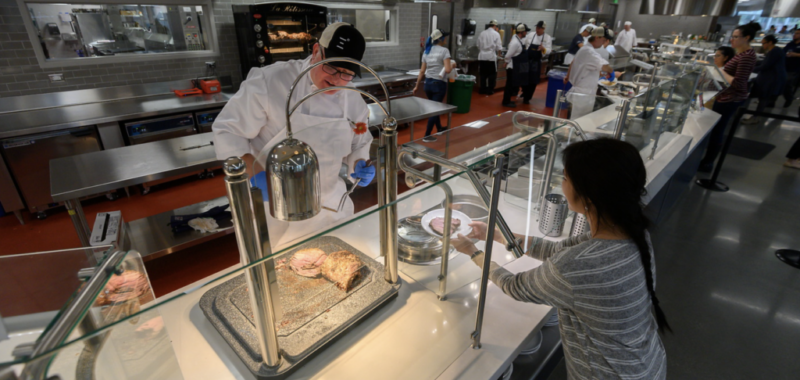
A dining commons at University of California Davis
Credit: Gregory Urquiaga / UC Davis
From curriculum to location, there’s so much to weigh when choosing a college or university.
And for high school seniors or prospective transfers who have dietary restrictions — particularly for medical reasons, including food allergies and chronic conditions such as celiac disease — picking a school that can accommodate their dietary needs is critical.
Before May 1, the official day to commit, here’s what to ask about dining halls, kitchen access and beyond.
Who should I reach out to?
The availability and range of options vary greatly from campus to campus, and the best way to get information is to ask the right people.
Reaching out to and scheduling an appointment with a campus dietitian nutritionist can be the easiest way to understand what options are available in the dining halls, and the extent to which the campus can guarantee safe options.
Some campuses have made extensive efforts. But others, like Cal Poly Humboldt and San Francisco State, can’t guarantee that meals can be made without cross-contamination.
“We understand how serious food allergies, celiac disease, and religious dietary needs can be, and we take those concerns to heart,” Todd Larsen, senior executive director for enterprise services at Cal Poly Humboldt, told EdSource. “While our kitchens are held to high safety and sanitation standards, they are not fully equipped to eliminate the risk of cross-contamination for individuals with severe dietary restrictions.”
Sometimes, campuses will also allow you to speak with a chef before a student enrolls; the chef can help answer specific questions about how meals are prepared and what kinds of measures they can take to prevent cross-contamination.
It’s also worth reaching out to current students or campus organizations focused on certain dietary needs for their perspective on the availability and safety of foods. This can also be helpful if you’re exploring what kinds of kosher or halal options are available.
Beyond dining services, it’s worth speaking with campus housing officials about living arrangements that include access to a kitchen.
What options are available at dining halls?
While dedicated kitchens are rare, many campuses throughout the state try to accommodate those with serious dietary needs — including labeling for top allergens and training for kitchen staff — but their approaches vary.
At some campuses, the options are more limited, with students being granted access to a common refrigerator stocked with frozen meals, whose labels students should read carefully before consuming.
UCLA, for example, takes such an approach, granting students with celiac disease, wheat allergies or gluten intolerance access to rooms with their own microwave, refrigerator, freezer, toaster and gluten-free meals.
Other campuses, like Sacramento State, have a dedicated station at a dining hall that features only allergen-free/friendly options or will allow students to work directly with an individual chef. And some, including UC Davis’s Dietary Support Program, grant students opportunities to order customized meals that are “prepared in a separate area, on separate equipment and by staff who have been trained on the dangers of cross-contact,” according to Emily Ortega, a registered dietitian nutritionist with the UC Davis Dining Services nutrition programs.
And if a student isn’t sure if something served in the dining halls is safe, or looks like it could be improperly labeled, it is important to check with the chef and inform the campus nutritionist.
Some campuses, like UC Merced, allow students to forgo their dining plan if the university cannot meet their needs. They may use a process that campus spokesperson Alyssa Flores Johansen says “involves multiple conversations, medical certification, and coordination with several campus stakeholders.”
What about access to a kitchen?
In addition to talking with the college or university’s dining program, it’s also important to contact housing to see what accommodations are provided.
For example, if a student needs access to an allergen station in a single dining hall, housing officials can sometimes place them in a dorm that’s closer.
At some campuses, like Cal State East Bay, all student housing includes a kitchenette. But that’s often not the norm, and housing officials can help explore options that include kitchen access, whether it’s living on the same floor as a communal kitchen where students can cook with their own pots and pans, or being assigned to an on-campus apartment.
On a smaller scale, within an individual dorm, it’s sometimes possible to request a separate refrigerator or microwave to help limit cross-contamination.
Think beyond the school year
It’s a good idea to jump on housing accommodations as soon as possible, and make sure a student’s needs will be met at dining halls from their first day of residency.
Ask about the hours of any dedicated station, what is provided during orientation, and what options are available during breaks.

